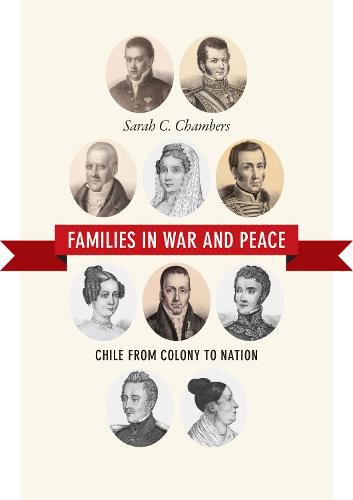Readings Newsletter
Become a Readings Member to make your shopping experience even easier.
Sign in or sign up for free!
You’re not far away from qualifying for FREE standard shipping within Australia
You’ve qualified for FREE standard shipping within Australia
The cart is loading…






This title is printed to order. This book may have been self-published. If so, we cannot guarantee the quality of the content. In the main most books will have gone through the editing process however some may not. We therefore suggest that you be aware of this before ordering this book. If in doubt check either the author or publisher’s details as we are unable to accept any returns unless they are faulty. Please contact us if you have any questions.
In Families in War and Peace Sarah C. Chambers places gender analysis and family politics at the center of Chile’s struggle for independence and its subsequent state building. Linking the experiences of both prominent and more humble families to Chile’s political and legal history, Chambers argues that matters such as marriage, custody, bloodlines, and inheritance were crucial to Chile’s transition from colony to nation. She shows how men and women extended their familial roles to mobilize kin networks for political ends, both during and after the Chilean revolution. From the conflict’s end in 1823 until the 1850s, the state adopted the rhetoric of paternal responsibility along with patriarchal authority, which became central to the state building process. Chilean authorities, Chambers argues, garnered legitimacy by enacting or enforcing paternalist laws on property restitution, military pensions, and family maintenance allowances, all of which provided for diverse groups of Chileans. By acting as the fathers of the nation, they aimed to reconcile the greater Chilean family and form a stable government and society.
$9.00 standard shipping within Australia
FREE standard shipping within Australia for orders over $100.00
Express & International shipping calculated at checkout
This title is printed to order. This book may have been self-published. If so, we cannot guarantee the quality of the content. In the main most books will have gone through the editing process however some may not. We therefore suggest that you be aware of this before ordering this book. If in doubt check either the author or publisher’s details as we are unable to accept any returns unless they are faulty. Please contact us if you have any questions.
In Families in War and Peace Sarah C. Chambers places gender analysis and family politics at the center of Chile’s struggle for independence and its subsequent state building. Linking the experiences of both prominent and more humble families to Chile’s political and legal history, Chambers argues that matters such as marriage, custody, bloodlines, and inheritance were crucial to Chile’s transition from colony to nation. She shows how men and women extended their familial roles to mobilize kin networks for political ends, both during and after the Chilean revolution. From the conflict’s end in 1823 until the 1850s, the state adopted the rhetoric of paternal responsibility along with patriarchal authority, which became central to the state building process. Chilean authorities, Chambers argues, garnered legitimacy by enacting or enforcing paternalist laws on property restitution, military pensions, and family maintenance allowances, all of which provided for diverse groups of Chileans. By acting as the fathers of the nation, they aimed to reconcile the greater Chilean family and form a stable government and society.